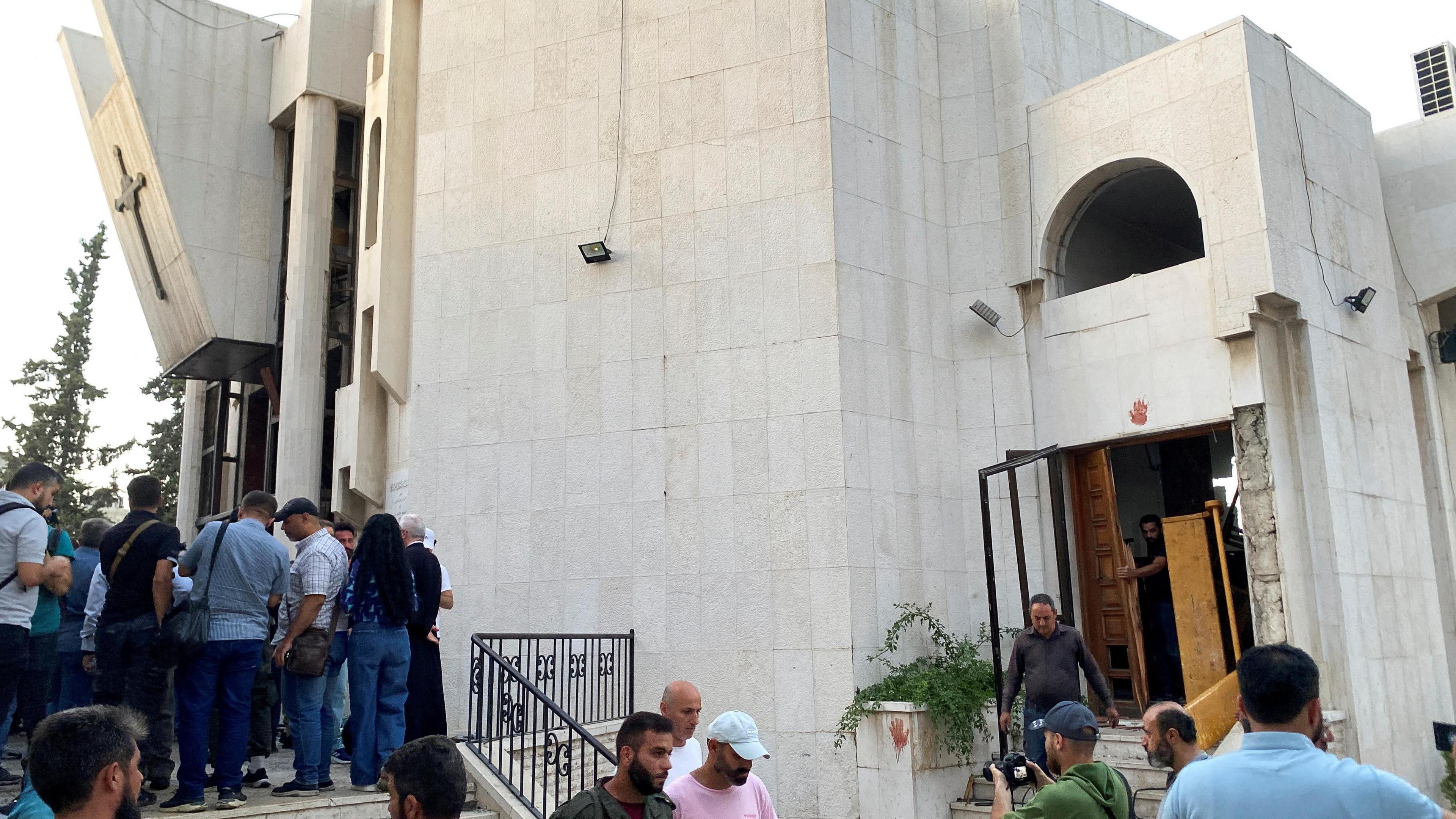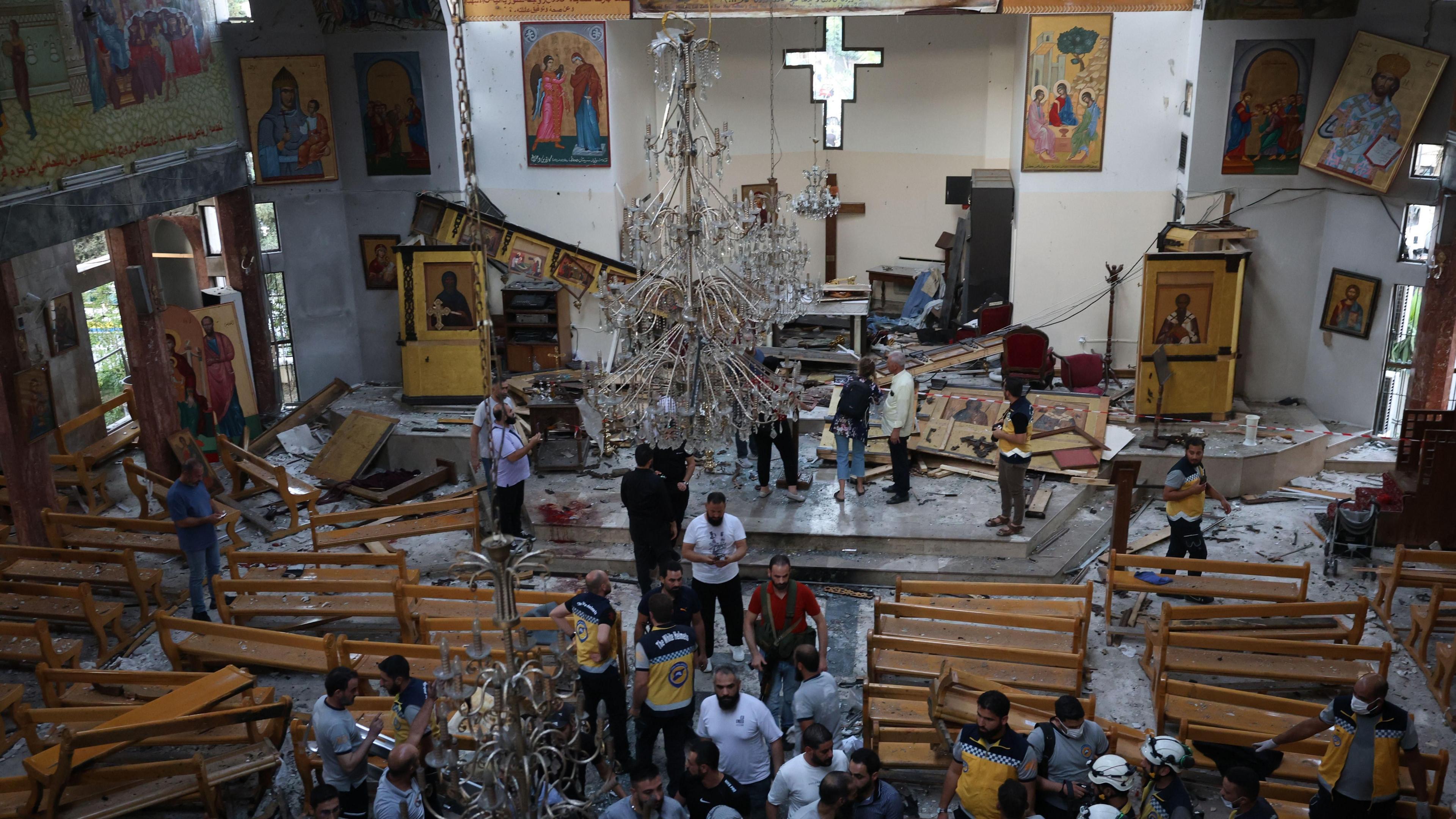Suicide bombing at Damascus church kills 25, Syrian authorities say

Pictures from inside Mar Elias Church showed a heavily damaged altar, pews covered in broken glass and a bloodied floor
- Published
At least 25 people have been killed and 63 others wounded in a suicide bomb attack at a church in Damascus, Syria's health ministry has said.
A man opened fire with a weapon at the Greek Orthodox Church of the Prophet Elias in the Dweila neighbourhood during a service on Sunday evening before detonating an explosive vest, according to the interior ministry.
It said the attacker was affiliated with the jihadist group Islamic State (IS). There was no immediate claim from the group itself.
Photos and video from inside the church showed a heavily damaged altar, pews covered in broken glass and blood spattered across the walls.
Witness Lawrence Maamari told news agency AFP that "someone entered [the church] from outside carrying a weapon" and began shooting. People "tried to stop him before he blew himself up", he added.
Another man who was in a nearby shop said he heard gunfire followed by an explosion that sent glass flying.
"We saw fire in the church and the remains of wooden benches thrown all the way to the entrance," Ziad said.
It was the first such attack in Damascus since Islamist-led rebel forces overthrew Bashar al-Assad in December, ending 13 years of devastating civil war.

The church is not far from the eastern Bab Sharqi gate of Damascus's Old City
The Greek Orthodox Patriarchate of Antioch said in a statement: "The treacherous hand of evil struck this evening, claiming our lives, along with the lives of our loved ones who fell today as martyrs during the evening divine liturgy."
According to initial information, the bomb blast occurred at the entrance to the church, resulting in the deaths of people who were both inside the building and in the immediate vicinity, it added.
The patriarchate called upon Syria's interim authorities to "assume full responsibility for what has happened and continues to happen in terms of violation against the sanctity of churches, and to ensure the protection of all citizens".
Greek Prime Minister Kyriakos Mitsotakis also called on the new, interim government "to take concrete measures to protect all ethnic and religious minorities" in Syria.
Interior Minister Anas Khattab said specialised teams from his ministry had begun investigating the circumstances of what he called a "reprehensible crime".
"These terrorist acts will not stop the efforts of the Syrian state in achieving civil peace," he added.
The office of UN special envoy for Syria, Geir Pedersen, condemned the attack and urged Syrians "to unite in rejecting terrorism, extremism, incitement and the targeting of any community".
US special envoy Tom Barrack said: "These terrible acts of cowardice have no place in the new tapestry of integrated tolerance and inclusion that Syrians are weaving."

The Greek Orthodox Church condemned the attack and urged Syria's interim authorities to "assume full responsibility"
Syria's interim President Ahmed al-Sharaa - whose Sunni Islamist group, Hayat Tahrir al-Sham (HTS), is a former al-Qaeda affiliate in Syria and is designated as a terrorist organisation by the UN, US and UK - has repeatedly promised to protect religious and ethnic minorities since seizing power.
However, Syria has been rocked by two waves of deadly sectarian violence in recent months.
IS has frequently targeted Christians and other religious minorities in Syria.
In 2016, the group claimed a series of blasts near the Shia Muslim Sayyida Zeinab shrine in a southern suburb of Damascus, which killed more than 70 people.
IS once held 88,000 sq km (34,000 sq miles) of territory stretching from western Syria to eastern Iraq and imposed its brutal rule on almost eight million people.
Despite the group's military defeat in Syria in 2019, the UN has warned that the threat posed by IS and its affiliates remains high.
A report published in February warned that the group might take advantage of the transition in Syria to surge attacks and make the country a renewed hub for recruiting foreign fighters.
It estimated that IS had between 1,500 and 3,000 fighters in Syria and neighbouring Iraq - most of which, including key leaders, based in Syrian territory. About 300 fighters were based in the central Badia desert, which served as a centre for planning external operations, it said.
More than 9,000 IS fighters are being detained in prisons spread across north-eastern Syria and 40,000 other people linked to IS, mostly women and children, are held in several camps.
The Arab League also condemned Sunday's attack, with Secretary-General Ahmed Aboul Gheit expressing "hope that the Syrian government will be able to deal with these terrorist organisations".